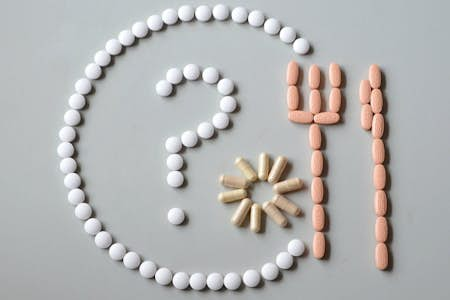Codeine is an opiate licensed for mild to moderate pain relief in the UK. On its own, codeine is a prescription-only medicine prescribed by medical professionals in healthcare settings to manage pain when more readily available painkillers are insufficient. Small doses of codeine are sometimes combined with other medications such as aspirin, ibuprofen and paracetamol (acetaminophen). You can buy it over the counter in some community pharmacies.
The scope of the problem in the UK
Codeine dependency can develop over time, leading to codeine abuse. Users can also become tolerant of codeine and need to take more to obtain the same effect or avoid withdrawal symptoms. Psychological dependence and cravings for codeine can give users a desire to continue using regardless of drug addiction's negative financial, physical, or social consequences.
In its pure form, you can only obtain codeine in the UK through medical prescriptions. However, over-the-counter packs of codeine, combined with other medicines, can be bought in some pharmacies. All medications containing codeine carry warnings highlighting the risk of addiction and advise short-term use only (maximum of three days) without medical advice.
However, despite efforts made by pharmacists to advise patients on limiting their treatment time, the overuse of codeine remains a public health problem. Several factors contribute to the overuse of codeine and consequent codeine addiction, including:
- Common misrepresentation on social media platforms - one study found that most codeine-related posts depicted codeine in its most commonly used form, combined with soda.
- Overprescription - there were over a million prescriptions of codeine and tramadol in 2020, many of which are continued treatments with no apparent cause. Prescription Cost Analysis data suggested that pharmacies dispensed more than 15 million co-codamol (codeine and paracetamol) packs in 2017 - an increase of approximately 15% from 2007.
- You can readily buy it - many people purchase codeine in pharmacies as a combination product with other painkillers and cough syrups. Although the information on over-the-counter medicines dictates precautions, the user often ignores these.
- Long-term use - codeine can manage chronic pain, including in patients being treated for cancer and fractures. However, as well as pain control, the user will most often also develop a tolerance and dependence on the medication.
In addition to the addictive properties of codeine, many users may be liable to further damage from compound products. For example, prolonged use of codeine and paracetamol combinations can lead to liver damage, and overuse of codeine and ibuprofen combinations can lead the user to develop gastrointestinal and kidney problems.
Codeine addiction in the elderly
Codeine is widely used amongst the elderly for the treatment of pain. However, given the complex myriad of potential conditions that can cause pain in older people, treatment becomes tricky.
Opiates are the mainstay of pain treatments for all age groups, but special care must be taken when prescribing these drugs to a population with impaired bodily functions. Many older people are given codeine due to its safer profile than higher-strength opioids despite the significantly increased mortality risk attributed to codeine use in people over 85.
There should be an official recognition that individual variability can alter the drug's effectiveness, which can lead to older people experiencing more side effects. Through these findings, clinicians must be aware that codeine should be used with caution within the elderly population to improve their well-being and reduce the possibility of physical dependence.
Symptoms and side effects of codeine addiction
Codeine addiction can be classified as a substance use disorder. Substance abuse in any form is recognised by several regulatory boards as a mental health condition that warrants the need for professional help. Overcoming codeine addiction is a challenging process that requires commitment from the individual and support from family and loved ones.
The effects of codeine are most prominent on the central nervous system. It can cause feelings of relaxation, drowsiness, nausea, confusion, constipation and itchiness, especially when taken at higher doses. When used for a prolonged period, these effects can magnify, affecting mental and physical health and in some instances, lead to fatal overdoses.
Codeine withdrawal
Withdrawal can occur when a user of any substance - such as benzodiazepines, oxycodone, and hydrocodone - starts to build up a tolerance to the drug. The same goes for codeine. When used for an extended time, the body needs more of the drug to elicit the same effects. As the body becomes more tolerant of codeine, it starts relying on its presence in your system so as not to withdraw. This dependence then leads to codeine withdrawal symptoms, which come in two phases.
The first phase occurs just a few hours after your last dose and may include:
- Runny nose
- Faster heart rate
- Feeling anxious or depressed
- Sweating
- Muscle aches
- Trouble sleeping
After a while, phase two symptoms begin, which can lead the user to develop the following symptoms:
- Loss of appetite
- Stomach cramps
- Feeling sick
- Diarrhoea
Codeine withdrawal symptoms usually last for around a week, but can persist for a few months, depending on the user's tolerance and how long they have previously been taking codeine. With treatment, users can find a way to cope with or relieve withdrawal symptoms in a smaller time frame.
Codeine addiction treatment
Codeine addiction treatment can be tough to find for some. Alongside the widespread stigma surrounding this prescription drug, users may be reluctant to seek alternative treatment options because of their heavy reliance on codeine. Certain fears or misconceptions suggest that users may believe that other pain medications may fail to alleviate pain effectively and so are rarely sought out.
Furthermore, the regional availability of codeine addiction treatment centres may act as a barrier to receiving care. There are, however, a vast number of addiction centres and services available for codeine-dependent users that help treat withdrawal symptoms and get the user back on the right path to recovery. Such services mostly include therapy, whereby a user will be allocated a therapist to discuss their behaviour, dependence and medication.
Therapy
Talking therapies such as cognitive behavioural therapy (CBT) can help manage your problems by altering how you behave and think. This is based on the premise that actions, sensations, feelings and thoughts are interconnected. CBT can be used for several mental and physical health issues and is most commonly used for mental health conditions such as depression and anxiety. Challenging and changing these negative patterns can improve how a person feels and guide them to recovery.
Detox
Detoxification is an option for those who wish to stop taking opioids completely. Codeine detoxification is accomplished by following a strict medication regime provided by a specialist addiction treatment prescriber. This service can be offered through inpatient or residential rehab centres where a user will reside in a safe and discreet environment which provides comprehensive care.
Outpatient treatment is also available, which may suit those with a more active lifestyle or who need to be at home for personal commitments. Certain medications used mainly to treat opioid use disorder, like methadone, may be used to help combat codeine withdrawal symptoms, depending on the situation.
Those feeling like they're missing the element of support can attend self-help and support groups. These groups are available nationwide and entail meetings with like-minded individuals on their road to recovery. Here, those addicted to codeine can talk amongst individuals with a similar condition, discuss treatment methods that have worked for them, and voice any concerns or troubles they may be experiencing during their detox.
Treatment is just around the corner
Codeine addiction is a serious health issue that not only causes several physical and psychological effects on the user but can also affect the lives of their loved ones. Although the treatment for codeine addiction may be challenging, numerous treatment centres are available across the UK to help those in need. Treatments can be tailored to individual requirements and can be provided through inpatient rehabilitation centres and outpatient follow-up clinics. If in doubt, users can check out the NHS website, which directs them to their nearest addiction treatment centres.









